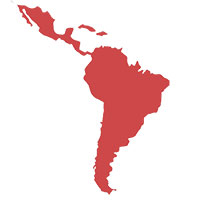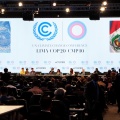Day 8 at COP20
Evan Weber | December 10, 2014.
Yesterday saw the COP turn its attention to gender and how it relates to climate change. Highlights included a high-level ministerial, with speeches from COP20 President Manuel Pulgar-Vidal and former Irish President and UN High Commissioner on Human Rights Mary Robinson.
“Women are suffering most of the effects of climate change,” said Pulgar-Vidal, highlighting that around the world women take on the responsibilities for caring for and feeding families — both of which can become more challenging with tighter food supplies and increased illnesses.
Earlier in the week, ministers debated whether a Paris agreement should include text about “gender equality” or “gender ‘balance.’” Robinson made her opinion on the matter plain: “Let us be clear that the 2015 agreement must include gender equality as a principle for a gender responsive measure to climate change.”
The ADP, see The Verb‘s wrap here, had the US and Japan maneuver to reduce the scope of any potential agreement in Paris, by insisting that the Durban Platform constitute the basis of any future agreement, thereby excluding provision for loss and damage. These moves were violently opposed by the poor countries bloc, represented by Tuvalu. The island nation’s chief negotiator stilled the audience when he fumed: “I want to make it perfectly clear that loss and damage must be a fundamental element of the agreement”.
Canada took the lead in attempting to amend the deadline for the announcement of the INDCs from May 2015 to being “any time before COP21”. Developing nations insisted on the May deadline, recognising that leaving the INDCs too late could be fatal for an agreement in Paris.
Contributions to the Green Climate Fund has finally cleared US$10 billion with a surprise announcement from Australia in the high-level ministerial that they would contribute AU$200 million. NGOs have welcomed this contribution hesitantly as much of this money has come from Australia’s recently cut international aid budget. Developing countries, including Saint Lucia, have explicitly called for climate finance to be new and not withdrawn from existing foreign aid.
Developed countries argued that mobilising public finance will help catalyse “a multiplier effect” of private finance, but governments still need to create enabling environments for that to happen. The UK emphasised that the implementation of funding is as important as the money itself. At least everyone agreed that the All parties agreed that common definitions of what constitutes climate finance need to be ironed out.
Outside of the conference, hundreds of Indigenous peoples from the northern Peruvian Andes arrived in a caravan and organised their own “People’s Summit” (separate from the Cumbre de los Pueblos) to protest around the mining and extraction that pollute rivers and lakes in their rural towns. The powerful stories of the real impacts faced each day by these Peruvians remind us how far we have to go on this long march towards justice.













comment